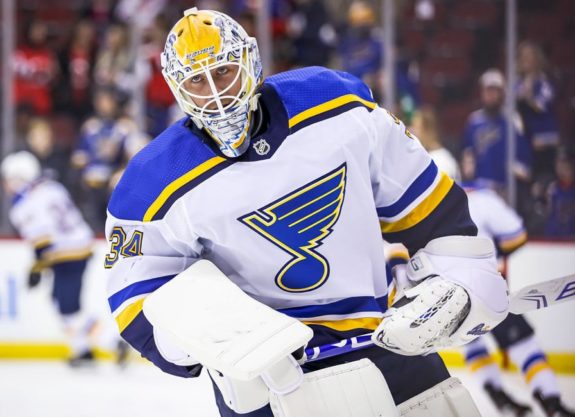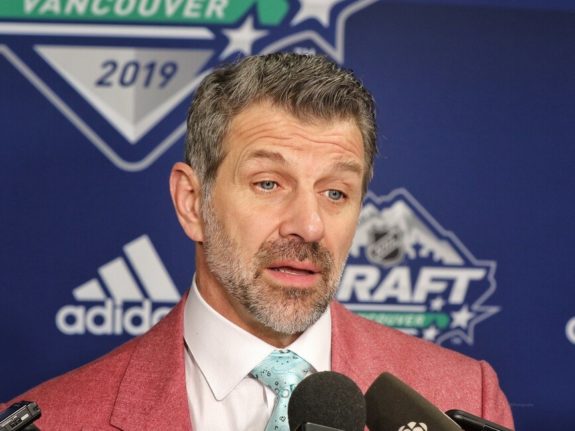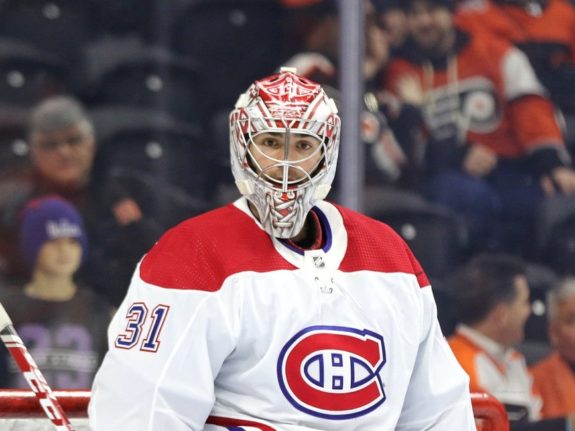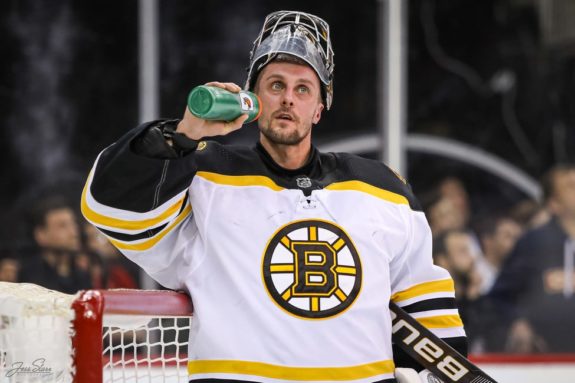Montreal Canadiens goalie Carey Price finally has his Jaroslav Halak. He just goes by Jake Allen instead.

After years of failing to properly insulate and rest Price, the Habs took a large step in the right direction by acquiring Allen from the St. Louis Blues. Canadiens general manager Marc Bergevin got Allen and a 2022 seventh-round pick for third and seventh-round picks in the upcoming NHL Entry Draft.
A Decent Get by Bergevin
For a goalie that was 12-6-3 with a .927 save percentage and 2.15 goals-against average, that’s a pretty decent get by Bergevin. There are drawbacks, though. For instance, Allen is 30 and set to become an unrestricted free agent next summer.

Furthermore, even though the asking price was relatively cheap, presumably so the Blues could clear space to take a run at re-signing Alex Pietrangelo, Allen himself isn’t. His $4.35 million cap hit is significant for a backup goalie, even if Allen was one of the best in the league this past season. It means the Habs are devoting almost $15 million in cap space to the goaltending position next season, which is less than ideal.
All that cap space of which the Canadiens had in excess? Allen eats up a major chunk of it. With the ceiling projected to stay flat at $81.5 million next season, Bergevin kind of handcuffed himself somewhat, simply to acquire a player who will only play 30 games or less.
Price Rediscovers His Dominance
Hopefully it’s closer to the 30, for the simple reason Price proved these past playoffs he can still be a dominant goalie at age 33. After a five-month layoff following a regular season in which he posted a pedestrian .909 save percentage (2.79 GAA), Price earned one of .936 during the two series he played (1.78).

It was admittedly a small sample size. Still, it was abundantly clear to whoever was watching that it was the same Price who stood on his head against the Boston Bruins in the second round of the 2014 playoffs to steal that series (also a .936 save percentage).
Effectively, Bergevin acquiring Allen helps Price to turn back the clock to a certain extent to when he was widely viewed as the best on the planet. Considering the make-up of this Habs team and how much it has relied on goaltending year in, year out with Price in net, the move is very understandable.
Allen Finds His Niche
For his part, Allen, who played for the Montreal Juniors of the Quebec Major Junior Hockey League, is no slouch. After being named the American Hockey League’s Outstanding Goaltender for the 2013-14 season, he established himself as the Blues’ No. 1 goalie in 2015-16, going 26-15-3 (.920; 2.35).
Allen admittedly suffered through some consistency issues between then and last season, ultimately losing the starting job to Jordan Binnington en route to capturing the Stanley Cup as his backup. In that role, he obviously shined, including during these past playoffs, when he outplayed Binnington, even getting in more minutes (286 vs. 267).
That isn’t to suggest Allen is a viable No. 1. It’s clear Allen is at his best with a reduced workload, having made 24 appearances this past season (28 over a full 82-game campaign). As Price has regularly played over 60 games, the acquisition should lead to a nice change of pace.
To illustrate, Boston Bruins goalie Tuukka Rask went from 54 games played in 2017-18 to 46 appearances in 2018-19 after they signed ex-Hab Halak to be his 1B. This past season, despite playing just 41 games, Rask is a favorite to win his second Vezina Trophy after going 26-8-6 (.929; 2.12). It’s unlikely Allen will end up limiting Price’s workload to that degree, but the ability to is a nice luxury to have, as is allowing Cayden Primeau to develop properly with the Laval Rocket.

Maybe Primeau will be ready for the NHL by the time Allen’s contract expires. In any case, there’s no denying Allen is far from a long-term solution. It is at least a sign that Bergevin has finally acknowledged that Price doesn’t just need a proper backup, but back-up in general.
Worst-case scenario, it’s an experiment that only affects the Habs in the 20-30 games Allen gets to play. We’ve already seen a sample of the best-case scenario though, where the Habs go on a lengthy playoff run, a single season after ranking 24th in the standings during the regular season. Quasi-realistically, the Habs can conceivably become contenders again if this turns out the way everyone hopes. And, if they do, for a nice change of pace it won’t be just because of Price.